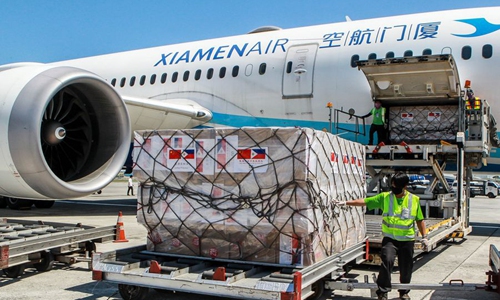HOME >> CHINA
China aids Philippines in virus prevention and control
By Bai Linlin Source:Global Times Published: 2020/4/9 0:23:40

Airport workers prepare to unload cargos of Chinese medical supplies from an airplane at Ninoy Aquino International Airport in Paranaque City, the Philippines, April 5, 2020. (Xinhua/Rouelle Umali)
After three busy days in Manila, China's Medical Expert Team aiding the Philippines has found problems in the Philippines' COVID-19 prevention, such as lack of testing and medical staff's low awareness of self-protection."We indicated the problems in the prevention work in the Philippines, and they paid attention to our suggestions," Weng Shangeng, head of the expert team, told the Global Times on Wednesday in an exclusive interview.
The Department of Health of the Philippines is particularly interested in China's experience including applying joint control, classifying regions by contagion risk and applying target prevention, according to Weng, who is vice president at The First Affiliated Hospital of Fujian Medical University (FAHFMU) in East China's Fujian Province.
By Wednesday afternoon, 3,870 people were confirmed to have COVID-19 in the Philippines, with 182 dead. Ninety-six people have recovered.
The 12-member medical expert team arrived in Manila on April 5 and started their work directly. They held seminars with officials from local health departments and visited several hospitals and institutes.
Chinese Ambassador to the Philippines Huang Xilian announced another batch of medical supplies had been donated to the Philippines by China, including 300,000 surgical masks, 30,000 medical N95 masks, 5,000 medical protective suits, 5,000 medical face shields, and 30 non-invasive ventilators.
According to Weng, the capability of testing in the Philippines is limited at present. Many samples are not tested on time and the testing is very slow.
"In China the result could come out within the day, but in the Philippines it takes 48 to 72 hours," he said, noting that this problem might have led to a big amount of patients not being tested and treated, which enlarged the outbreak.
Weng said that the Philippines lacks test kits as well as trained staff to do the tests.
The Chinese medical team also found that local medical staff's awareness of self-protection should be enhanced as well. Some staff only wear masks and not protective suits, face shields or goggles.
Also, the number of beds in local hospitals is not enough. The medical team urged the health department to build more makeshift hospitals as soon as possible. "The more patients are hospitalized, the smaller the risk of the virus spreading."
According to Weng, five members of the Chinese expert team had been working at the frontline in Wuhan, Central China's Hubei Province. They are experienced and would like to provide professional direction and training. "We will try our best to help train the medical staff here."
"We have told the Filipino side that China's success in preventing COVID-19 does not only rely on the medical system. The government departments also have motivated people to come together to fight the virus," he said, noting that China's experience could help the Philippines to strengthen its ability in fighting the pandemic and avoid unnecessary losses and costs.